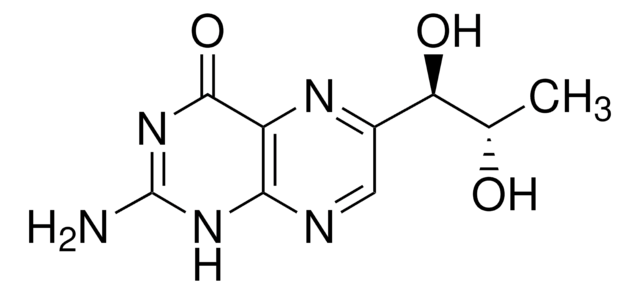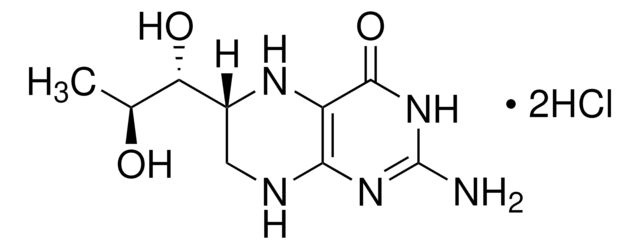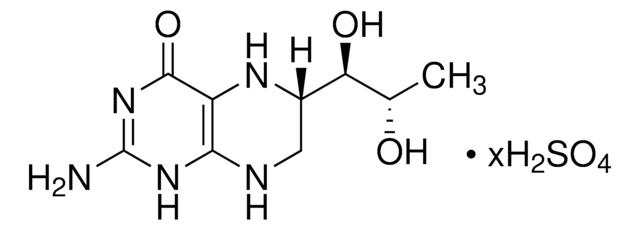37272
7,8-Dihydro-L-biopterin
≥94% (HPLC)
Synonyme(s) :
2-amino-6-(1,2-dihydroxypropyl)-7,8-dihydro-3H-pteridin-4-one
About This Item
Produits recommandés
Niveau de qualité
Pureté
≥94% (HPLC)
Température de stockage
−20°C
Chaîne SMILES
C[C@@H](O)[C@@H](O)C1=NC2=C(NC1)N=C(N)NC2=O
InChI
1S/C9H13N5O3/c1-3(15)6(16)4-2-11-7-5(12-4)8(17)14-9(10)13-7/h3,6,15-16H,2H2,1H3,(H4,10,11,13,14,17)/t3-,6-/m1/s1
Clé InChI
FEMXZDUTFRTWPE-AWFVSMACSA-N
Application
- A Landscape of Metabonomics for Intermingled Phlegm and Blood Stasis and Its Concurrent Syndromes in Stable Angina Pectoris of Coronary Heart Disease.: This study by Zheng et al. (2022) explores the metabolic profiles associated with phlegm and blood stasis syndromes in patients with stable angina pectoris. The research highlights the role of various metabolites, including 7,8-Dihydro-ʟ-biopterin, in the pathophysiology of these syndromes, suggesting potential diagnostic and therapeutic targets (Zheng et al., 2022).
- Three-dimensional structure of human tryptophan hydroxylase and its implications for the biosynthesis of the neurotransmitters serotonin and melatonin.: Wang et al. (2002) present the crystal structure of human tryptophan hydroxylase, providing detailed insights into the enzyme′s interaction with cofactors such as 7,8-Dihydro-ʟ-biopterin. This structural information is crucial for developing drugs targeting neurotransmitter biosynthesis pathways (Wang et al., 2002).
Code de la classe de stockage
11 - Combustible Solids
Classe de danger pour l'eau (WGK)
WGK 3
Point d'éclair (°F)
Not applicable
Point d'éclair (°C)
Not applicable
Équipement de protection individuelle
Eyeshields, Gloves, type N95 (US)
Certificats d'analyse (COA)
Recherchez un Certificats d'analyse (COA) en saisissant le numéro de lot du produit. Les numéros de lot figurent sur l'étiquette du produit après les mots "Lot" ou "Batch".
Déjà en possession de ce produit ?
Retrouvez la documentation relative aux produits que vous avez récemment achetés dans la Bibliothèque de documents.
Les clients ont également consulté
Notre équipe de scientifiques dispose d'une expérience dans tous les secteurs de la recherche, notamment en sciences de la vie, science des matériaux, synthèse chimique, chromatographie, analyse et dans de nombreux autres domaines..
Contacter notre Service technique















